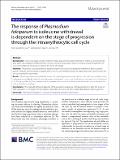The response of Plasmodium falciparum to isoleucine withdrawal is dependent on the stage of progression through the intraerythrocytic cell cycle
Author(s)
McLean, Kyle J.; Jacobs-Lorena, Marcelo
Download12936_2020_Article_3220.pdf (1.303Mb)
Publisher with Creative Commons License
Publisher with Creative Commons License
Creative Commons Attribution
Terms of use
Metadata
Show full item recordAbstract
Background: A previous study reported that the malaria parasite Plasmodium falciparum enters an altered growth state upon extracellular withdrawal of the essential amino acid isoleucine. Parasites slowed transit through the cell cycle when deprived of isoleucine prior to the onset of S-phase. Methods: This project was undertaken to study at higher resolution, how isoleucine withdrawal affects parasite growth. Parasites were followed at regular intervals across an extended isoleucine deprivation time course across the cell cycle using flow cytometry. Results: These experiments revealed that isoleucine-deprived parasites never exit the cell cycle, but instead continuously grow at a markedly reduced pace. Moreover, slow growth occurs only if isoleucine is removed prior to the onset of schizogony. After S-phase commenced, the parasite is insensitive to isoleucine depletion and transits through the cell cycle at the normal pace. Conclusions: The markedly different response of the parasite to isoleucine withdrawal before or after the onset of DNA replication is reminiscent of the nutrient-dependent G1 cell cycle checkpoints described in other organisms.
Date issued
2020-04Department
Massachusetts Institute of Technology. Department of Biological EngineeringJournal
Malaria Journal
Publisher
Springer Science and Business Media LLC
Citation
McLean, Kyle Jarrod and Marcelo Jacobs-Lorena. "The response of Plasmodium falciparum to isoleucine withdrawal is dependent on the stage of progression through the intraerythrocytic cell cycle." Malaria Journal 19, 1 (April 2020): 147 © 2020 Springer Nature
Version: Final published version
ISSN
1475-2875